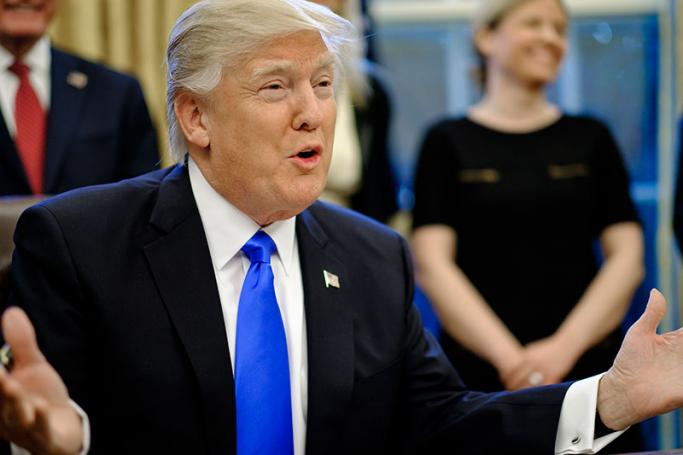How US President Donald Trump will adjust US policies toward major countries has been gripping the headlines lately. For US-Myanmar relations, some observers deem that his strategy for the Southeast Asian country remains uncertain while a few Western scholars urge him to inherit Obama’s Myanmar policy. It is noteworthy what policy the Trump administration will formulate toward Myanmar and how Washington-Nay Pyi Taw ties will develop in the future.
Vowing to put “America First,” Trump has made domestic affairs his top priority.
He called for US allies to assume more responsibility for their own security. In addition, he is likely to restrict legal immigrants with hard-edged positions. In a sense, Myanmar seems too far away from him.
In the economic arena, he will probably reduce assistance to Myanmar in fear of investment outflow and even turn a blind eye to the peace process the National League for Democracy-led government has been committed to promoting. He will not attach as much importance to US connection with Myanmar as Barack Obama who has lifted most of the economic sanctions against the country.
Washington’s influence on Southeast Asia may decrease though it will not necessarily lead to a withdrawal from the strategically important region. Meanwhile, Nay Pyi Taw will realize that a change in the US’ Myanmar policy may wield profound impact on its domestic affairs as well as the regional architecture.
The US president and his security and diplomacy team are major decision-makers of foreign policy. They will display a rough contour of US diplomacy within six to 12 months. Trump’s ignorance of foreign policy might be a burden but also could become an opportunity because he is quite adaptable to any kind of diplomatic relationship. He is known for not following the game rules and change will become a prominent feature in his foreign policy. Therefore, it is hard to predict how he will adjust the White House’s Myanmar policy.
Trump’s team will probably maintain the status quo in US-Myanmar political and economic relations. Generally speaking, Washington’s Myanmar policy will not see any significant alterations after Trump comes into power. Both Democrats and Republicans have adopted similar policies toward Nay Pyi Taw.
Economic power is a crucial diplomatic lever in the Southeast Asian region. If Myanmar fails to gain more support from the US, it may further its partnership with China, the Asian powerhouse. Southeast Asia has been on the top of China’s diplomatic agenda. And in the principle of “amity, sincerity, mutual benefit and inclusiveness” and the “One Belt, One Road” initiative, Beijing will continue promoting cooperation with Nay Pyi Taw and handle disputes via dialogues in a non-zero-sum way. China does not seek exclusive hegemony in this region; it also objects to any other country creating such hegemony. China is firmly convinced that peace and stability in Southeast Asia is an inevitable trend, the greatest common denominator to the satisfaction of all parties involved.
How is Beijing going to counter Trump’s bellicose remarks about China? One of the options is to deepen relations with Southeast Asian nations including Myanmar. Then, it is more accurate to compare Nay Pyi Taw to a pie which Beijing and Washington are fighting over rather than calling it a pawn in a chess game. In light of the Trump team’s inclination to prioritize domestic affairs and trend of protectionism, China will put more effort in gaining Myanmar’s support.
China believes that the era of globalization calls for an open foreign policy to achieve progress on all levels. Now that Myanmar’s political reform has had initial success, the new leadership is deeply aware of the fact that development will bring about numerous advantages to the stability of its regime.
Hitching a free ride off China on the fast track of development constitutes one of the shortcuts for Myanmar to advance its own development. Beijing’s peripheral foreign policy based on cooperation, opening up and all-round progress conforms to the interests of both China and Myanmar, lives up to the public expectation for a fairer, more rational international order, and meets the demand of the epoch.
The author is a professor at the School of International Studies and Center for China’s Neighbor Diplomacy Studies at Yunnan University.
Courtesy Global Times
You are viewing the old site.
Please update your bookmark to https://eng.mizzima.com.
Mizzima Weekly Magazine Issue...
14 December 2023
Spring Revolution Daily News f...
13 December 2023
New UK Burma sanctions welcome...
13 December 2023
Spring Revolution Daily News f...
12 December 2023
Spring Revolution Daily News f...
11 December 2023
Spring Revolution Daily News f...
08 December 2023
Spring Revolution Daily News f...
07 December 2023
Diaspora journalists increasin...
07 December 2023
Euromoney Myanmar Global Investment Forum begins in Nay Pyi Taw












